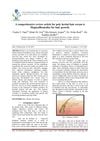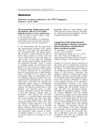
MagicalRemedies serum effectively promotes healthy hair growth and reduces damage.
 March 2024 in “Jurnal Tata Rias”
March 2024 in “Jurnal Tata Rias” Ginger hair tonic can reduce hair loss and improve hair quality.
 July 2018 in “Elsevier eBooks”
July 2018 in “Elsevier eBooks” The most common cause of hair loss in children is tinea capitis, followed by alopecia areata and telogen effluvium.
 March 2010 in “Cosmetic Dermatology”
March 2010 in “Cosmetic Dermatology” Hair straightening methods have advanced to improve effectiveness and reduce damage, but still rely on heat and chemicals.
 2 citations,
September 2004 in “International Journal of Cosmetic Science”
2 citations,
September 2004 in “International Journal of Cosmetic Science” Hair quality is genetically determined and linked to its composition and strength.
 March 2005 in “International Journal of Cosmetic Science”
March 2005 in “International Journal of Cosmetic Science” DVI provides detailed 3D imaging of hair and shows how various products protect and enhance hair.
 10 citations,
February 2011 in “Journal der Deutschen Dermatologischen Gesellschaft”
10 citations,
February 2011 in “Journal der Deutschen Dermatologischen Gesellschaft” The document concludes that proper diagnosis and evidence-based treatments are crucial for managing hair diseases, and psychological support for patients is important.
51 citations,
January 2014 in “International journal of trichology” Shampoo pH can affect hair health, with alkaline shampoos potentially causing damage and acidic shampoos reducing frizz.
 June 2024 in “International Journal For Multidisciplinary Research”
June 2024 in “International Journal For Multidisciplinary Research” Herbal powder shampoo is effective, safe, and beneficial for various hair needs.
 75 citations,
March 2009 in “Journal of The American Academy of Dermatology”
75 citations,
March 2009 in “Journal of The American Academy of Dermatology” CCCA is a hair loss type affecting African women, possibly caused by grooming and chemicals, with various treatments and needing more research.
 3 citations,
February 2023 in “ACS omega”
3 citations,
February 2023 in “ACS omega” Grape seed oil improved hair quality the most, followed by rosehip and safflower seed oils, and reduced damage from shampoo.
2 citations,
July 2018 in “Skin research and technology” Greasy hair spreads sebum twice as much as nongreasy hair over time.
 June 2024 in “International journal of women’s dermatology”
June 2024 in “International journal of women’s dermatology” Dermatology residents need better training to treat hair conditions in patients with skin of color.
 November 2023 in “International Research Journal of Modernization in Engineering Technology and Science”
November 2023 in “International Research Journal of Modernization in Engineering Technology and Science” Herbal shampoos clean and improve hair naturally without harmful side effects.
5 citations,
March 2023 in “Cancer” Oncologists should better understand the unique impact of hair loss on Black breast cancer patients to offer more compassionate care.
36 citations,
August 2012 in “Dermatology online journal” Using wigs, hairpieces, and sprays can help people with hair loss feel better about themselves.
 30 citations,
January 2014 in “Dermatologic Clinics”
30 citations,
January 2014 in “Dermatologic Clinics” Tight hairstyles, especially on chemically treated hair, can cause reversible hair loss if caught early but may become permanent if not addressed.
 June 2021 in “Journal of Emerging Technologies and Innovative Research”
June 2021 in “Journal of Emerging Technologies and Innovative Research” Rice water and hibiscus can help improve hair health and growth.
January 2021 in “Lecture notes in mechanical engineering” High temperatures, acidic conditions, and too much coconut oil damage hair, while a pH of 5 to 7 keeps it healthy.
63 citations,
February 2017 in “ACS biomaterials science & engineering” Polydopamine is a safe, effective, and permanent hair dye that turns gray hair black in one hour.
12 citations,
October 2018 in “Biotechnology reports” Recombinant keratin K31 makes damaged hair thicker, stronger, and straighter.
 February 2025 in “International Journal of Advanced Research in Science Communication and Technology”
February 2025 in “International Journal of Advanced Research in Science Communication and Technology” Fenugreek seeds may improve hair health and growth.
 January 2025 in “Medicina”
January 2025 in “Medicina” 25% of women in North Sudan have traction alopecia, linked to family history and hair treatments, highlighting the need for better hair care awareness.

The herbal shampoo effectively reduces dandruff and hair fall.
Human hair can almost fully recover its structure within about 1,000 minutes after being stretched.
 November 2022 in “Cosmetics”
November 2022 in “Cosmetics” Red pigmented rice, like Sang-Yod rice, could help promote hair growth and prevent hair loss.
 July 2012 in “Springer eBooks”
July 2012 in “Springer eBooks” The document concludes that proper diagnosis and treatment of nonscarring alopecias can improve quality of life and hair regrowth is possible as the hair follicle remains intact.
3 citations,
December 2021 in “Frontiers in Pharmacology” Ficus benghalensis leaf extracts can effectively promote hair growth and inhibit hair loss.
 November 2024 in “Fermentation”
November 2024 in “Fermentation” Fermented ginsenosides from kimchi bacteria may promote hair growth better than finasteride.
 December 2024 in “International Journal For Multidisciplinary Research”
December 2024 in “International Journal For Multidisciplinary Research” Nilibhrungarajadi tailam improved hair growth and shine in a young woman with hair loss.





















